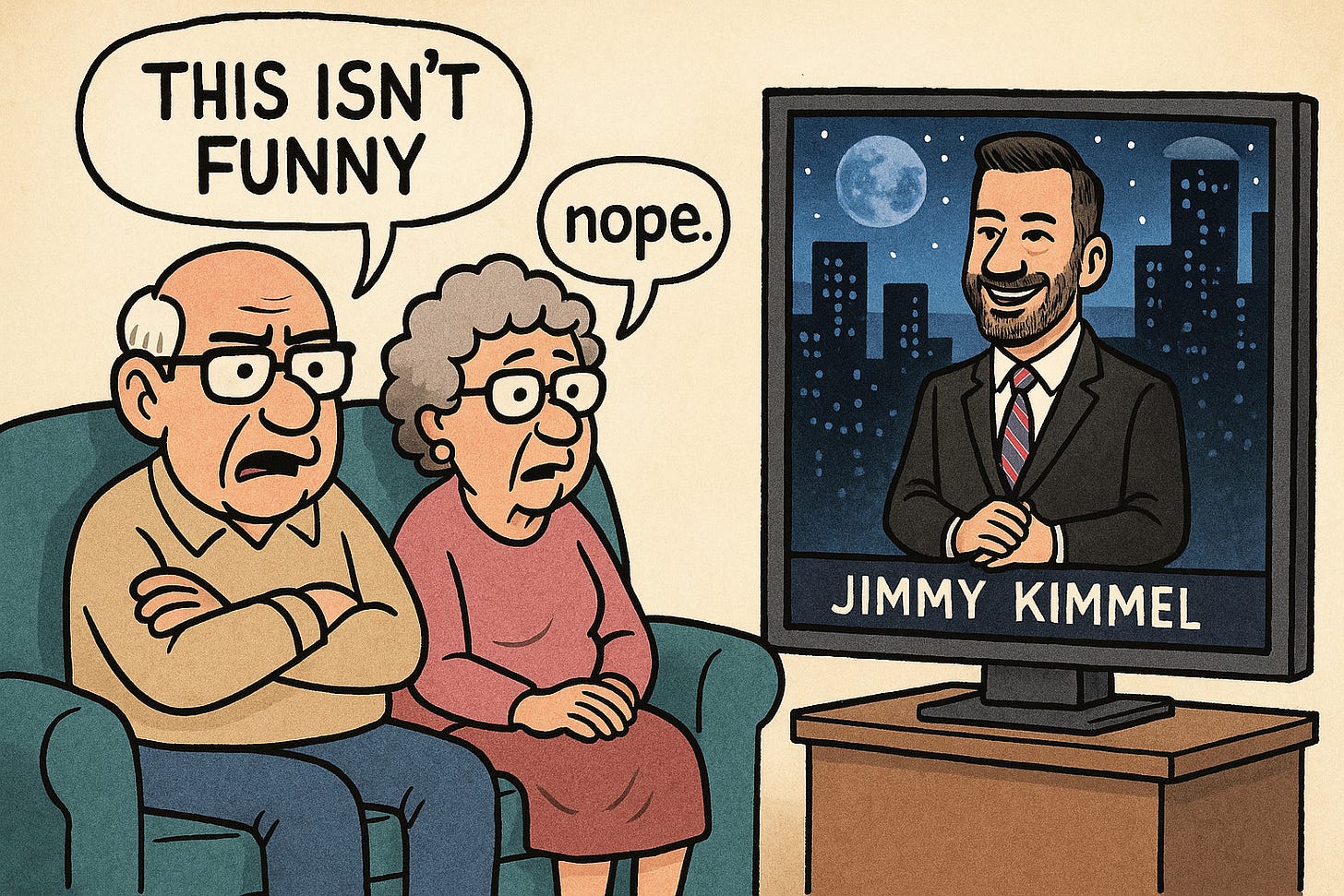Kimmel Returns: Still Unrepentant, Still Protected by the First Amendment, and Still Not Funny
Jimmy Kimmel’s ABC return drew an estimated 1.4 million viewers, up from recent averages but trailing top-rated Gutfeld!’s 3.1 million.
Typically our afternoon posts are mostly behind a paywall, reserved for our premium members. I have made this one available to everyone.
⏱ 5 Min Read
A Missed Chance for Accountability
Jimmy Kimmel’s return to late-night TV yesterday, after a six-day suspension for awkard-at-best remarks on Charlie Kirk’s assassination, gave him a chance to own up. His 18-minute monologue relied on emotional appeals and pointed to Erika Kirk’s forgiveness, but stopped short of a real apology for linking the killer—a 22-year-old with left wing ties — to MAGA rhetoric. Prosecutors confirmed the bullet inscription showed anti-conservative hate, not MAGA ties.
Instead of offering clarity and humility, Kimmel hid behind self-pity and theatrics. By framing his absence as an attack on comedy, he acted like a victim instead of taking responsibility—blowing a chance to regain credibility.
[If you have not seen it but want to see it, Kimmel’s opening monologue is posted beneath this column.]
Imbalance Under the Spotlight
Late-night television should reflect diverse perspectives, but the facts tell a different story. A 2025 Media Research Center study of 369 episodes found 92% of political content on major shows targeting conservatives, with 97% of guests left-leaning. Unlike Johnny Carson, who engaged Ronald Reagan respectfully, today’s hosts—Kimmel and Colbert—never give conservatives a fair shot. Even Jay Leno gave George W. Bush or John McCain a fair shake. Kimmel and Colbert cannot bring themselves to treat conservative leaders as human beings, let alone guests.
Federal Communications CommissionChairman Brendan Carr crossed a line by implying regulatory consequences for Kimmel’s remarks, threatening to stifle expression — completely inappropriate for a government regulator. Yet Kimmel’s outrage over this “authoritarianism” ignores the Biden administration’s pressure to deplatform conservatives—from Trump’s social media bans to reporters like Sharyl Attkisson and Megyn Kelly. Affiliates like Sinclair and Nexstar, controlling dozens of ABC stations, preempted the return, citing civility, only to face calls from Democrats like Scott Wiener for picking and choosing when to back free speech.
A Business Model in Decline
Late-night’s goal of uniting people with laughs is collapsing. Kimmel’s 1.4 million viewers showed a temporary boost from August’s 1.1 million low, but still point to freefall—down 20% year-over-year, against Gutfeld!’s 3.1 million. Since 2016, the genre’s market share has dropped 40%, as viewers turn to podcasts and balanced satire. When more people watch a YouTube podcaster in a garage than Kimmel in a Hollywood studio, that shows exactly why viewers are tuning out.
Carson’s 9 million nightly viewers came from humor that rose above politics; today’s one-sided tirades drive viewers off. Disney’s commitment through 2026, despite affiliate pushback and legal scrutiny from Trump allies, was not about profit.
So, Does It Matter?
Kimmel’s return comes down to three points. First, late-night’s slant is obvious—92% of political content targets conservatives, sidelining half the nation’s views. When you go after politicians of all stripes, it can be funny. Which takes us to the second point — Kimmel, like Colbert, is not funny anymore - at least not to a wide swath of people who think Elizabeth Warren and Bernie Sanders are coo coo for Cocoa Puffs. Trump takes over their attention (TDS), endlessly attacking conservatives with unfunny partisan rhetoric. Third, Kimmel did get the heart of the First Amendment right: it shields speech from government overreach, a principle worth defending.
He stated, “A government threat to silence a comedian you disagree with is anti-American.” Conservative U.S. SenatorTed Cruz also spoke to this, saying, “Free speech means everyone gets to speak, even those you disagree with.” Or as I would put it: free speech is not about protecting voices you already like—it is about tolerating the ones you cannot stand.
I have largely stopped watching late-night TV, especially after James Corden’s departure. For all his faults, Corden could still produce moments that cut across politics, whether in his Carpool Karaoke bits or his over-the-top truth-or-eat skits that put celebrities in awkward, humanizing situations. That kind of creativity actually pulled people in. What we get from Kimmel and Colbert instead are nightly sermons pretending to be comedy.
What will ultimately retire these unfunny hosts will not be a government action, but the market system and plummeting ratings. Comedy is supposed to make people laugh—but when the joke is always the same, the audience eventually stops laughing.
Here’s 17 minutes of not funny, if you missed it last night.
Oh yeah, this reminder from my friend Michael Knowles.


